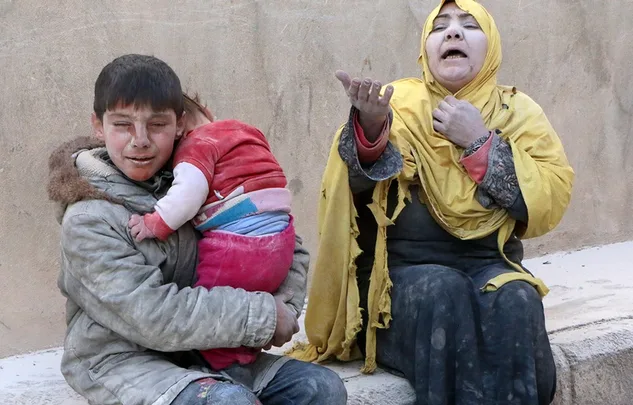This morning Australians woke to discover that the fragile Syrian ceasefire had collapsed overnight.
The deal, struck on Tuesday, was supposed to allow tens of thousands of civilians to be evacuated from the besieged city of Aleppo. Instead, buses meant to ferry people to safety were turned back amid heavy shelling, according to the ABC.
Just hours ago, it was announced that a second ceasefire may begin on Thursday, but meanwhile, the messages coming from the besieged city have grown increasingly bleak.
The White Helmets – the Nobel-Prize-nominated Syrian Civil Defence Force – posted this devastating tweet yesterday. “We hear children crying, we hear calls for help, but we just can’t do anything. We’re being bombed continuously.”
It is the latest, tragic episode in a five-year war that has claimed the lives of a quarter of a million people including many children.
There are 14,000 kilometres between Sydney and Aleppo, and on a day like today – when the most serious problem many Australians are facing is pre-Christmas stress – that distance can seem very far indeed.
Yet, there is a way to help. And it doesn’t involve ‘liking’ a Facebook post or donating to a charity.
Veteran war journalist Janine di Giovanni, the Middle East editor of Newsweek and a contributing editor for Vanity Fair, says that “Money is not the answer. [The charities] have tons of money. What is more important is [that people] understand what is happening so far from their homes but to people just like them.
“This is the first step, because when people are aware they can make a louder noise,” says Di Giovanni, who wrote The Morning They Came For Us, Dispatches from Syria. “They will be angry and sad and they will feel the need to do something – like writing a letter. These things add up.”
Di Giovanni, who has reported from some of the most dangerous places on earth – from Iraq to Libya and Syria, says that only public pressure will put a stop to the Syrian conflict. “This is how we helped to end the war in Bosnia – by public awareness and pressure.”
ABC journalist Sophie McNeil agrees, saying that aid agencies and the UN have the food and equipment to help the besieged Syrians. “We did a story about the town Madaya… The UN had the food – it was in warehouses in Damascus 40 kilometres away. It wasn’t delivered because the Syrian government didn’t give them permission to go to those areas.”
“This is not an issue of funding. This is an issue of the world turning its back on the Syrian people,” says McNeil, a Walkley-Award-winning journalist who is based in Lebanon and has been reporting on the Middle East for 10 years.
“We haven’t seen the political pressure exerted on the players [in the war].”
McNeil emphasizes that the Syrian conflict has violated international law in ways that have never been seen before.
“The rules of conflict and the rules of war have been erased. You’re not meant to bomb hospitals, you’re not meant to target doctors, you’re not meant to starve children to death as a tactic of war. But this has been normalised in this conflict.”
McNeil’s comments echo those of the UN High Commissioner for Human Rights, Ra’ad al Hussein who yesterday said that the Government of Syria is obliged under international law to provide medical assistance to all sick and wounded people – and that it is “palpably failing to do so”.
McNeil warns that ignoring the fate of Syrians will have far-reaching consequences. “We can sit here and think [the Syrian war] doesn’t affect us… but the world is going to pay a price for turning its back on Syria – with the rise of extremism… the group ISIS… the instability of the Middle East… the refugee crisis. All of this has come out of the world not giving a shit about what’s happening in Syria.
“You may think [the Syrian crisis] doesn’t directly affect you, but what kind of world do you want to live in? If you have kids, what kind of world do you want them to live in? People need to think: is this the kind of world I want to live in?
“If you are disturbed by what you’ve seen in Syria, and you wish that it had never happened, and that things would get better, do something. As a reporter who spends all my time trying to tell people [what’s happening]… I can’t do anymore to tell you how bad things are, how horrific it is.
“I’m sick of people liking something on Facebook, or thinking they’re clever by tweeting some sad photo. Join Amnesty International, join Human Rights Watch… actually do something. The world needs humanitarian-minded people right now.”
HOW TO HELP NOW – TAKE ACTION
Know your facts
- More than 250,000 people have died in the five-year Syrian war
- It is being fought between two sides of the same country – supporters of the president of Syria, Bashar al-Assad, and the rebels
- Aleppo has been at the centre of the conflict
Write a letter to Foreign Affairs Minister Julie Bishop, expressing your concern. (Hon Julie Bishop, PO Box 6022, House of Representatives, Parliament House, Canberra ACT 2600)
Join Amnesty International or Human Rights Watch
Exert pressure by signing an Amnesty International petition or donate here (where an Amnesty donor has pledged to match funds 1:1).
 Getty
Getty









